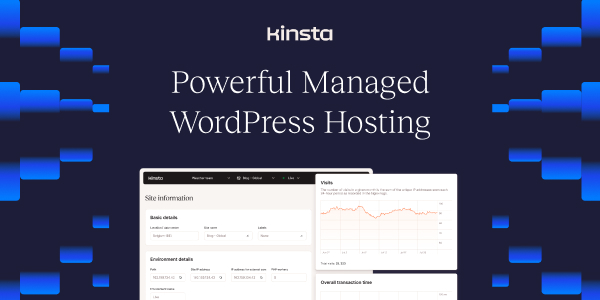1. Migrating from Medium to WordPress has it’s own Pros and Cons.
2. You can migrate your published & draft posts from Medium to WordPress easily.
3. Medium’s export file isn’t compatible with WordPress so you will need to convert it first.
When WordPress was competing with Blogspot, one of the most important differentiators was the control WordPress had to offer. WordPress is still the best blogging platform for beginners, solopreneurs and even big brands.
If you’ve been blogging on Medium for some time, I suppose you would’ve noticed the difference by now. Medium is a great platform for blogging, I personally know several creators making a decent income by writing on Medium. There’s a Medium partner program that pays writers, and you can promote your products/services and directly make money off your content.
From a blogging point of view, there’s nothing that I can count as a drawback in Medium. I personally love the platform, and I’ve gained a lot by writing on it. I don’t actively use the platform, but I’ve used it for long enough to be aware of the pros and cons of the platform.
However, from an SEO standpoint, Medium lacks a lot. That’s exactly what I will target in this post.
If you already have a WordPress website and want to import content from Medium to WordPress, this post will be of great value. If you don’t have a WordPress website, here’s a guide to get started with blogging on WordPress you can follow.
But first, let’s address the big elephant in the room and start with how to migrate from Medium to WordPress. If you’ve already migrated, you can skip to “Next steps after migrating from Medium to WordPress.”
Why should you move content from Medium to WordPress?
Look, Medium’s great for getting your feet wet with blogging, but it’s like renting an apartment – you’re limited in what you can do with the place. It’s “Your Brand, Their Authority” kinda situation. WordPress is more like owning your own home.
If you’ve already got a WordPress blog, bringing in your Medium posts is a no-brainer. It beefs up your content library without having to write new stuff from scratch. Plus, you can tweak those posts to fit your WordPress site’s style. Maybe that listicle you wrote on Medium would work better as a longer guide on WordPress.
For folks thinking about jumping ship from Medium to WordPress, it’s all about control. On Medium, you’re at the mercy of their algorithms and rules. With WordPress, you call the shots. Want to slap ads all over your posts? Go for it. Feel like completely overhauling your site’s look? No problem.
Sarah, for example, started a food blog on Medium, and it went okay. But when she moved to WordPress, she could add recipe cards, and nutrition info and even sell her own cookbook directly from her site. She can also add membership plans right into her site, where users can log in and access membership benefits.
The bottom line is Medium’s training wheels, WordPress, are the full bike. If you’re serious about blogging or using your content to make money, WordPress gives you way more options to grow and experiment.
How to migrate from Medium to WordPress?
When you migrate from Medium to WordPress, you can export your published posts, drafts, stories you’ve engaged with and more. For this post, I’ll assume that you already have a web hosting to migrate to, if not, I’d recommend Kinsta. all you have to care about is published posts and drafts.
Let’s see how to import content from Medium to WordPress.
Step 1: Export data from Medium
Login to your Medium profile, click on your profile icon in the top right corner, and then click on Settings.
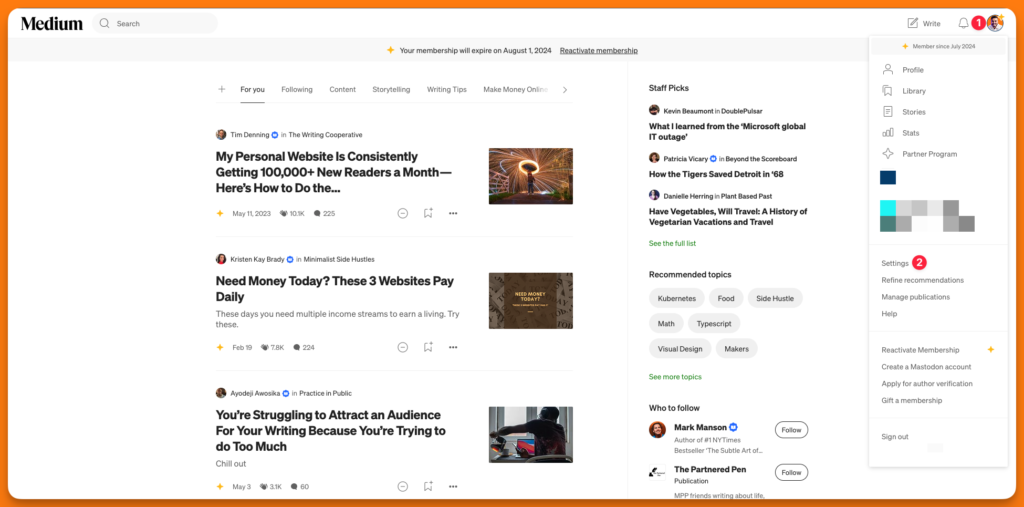
Click on “Security and apps” and then click on “Download your information”.
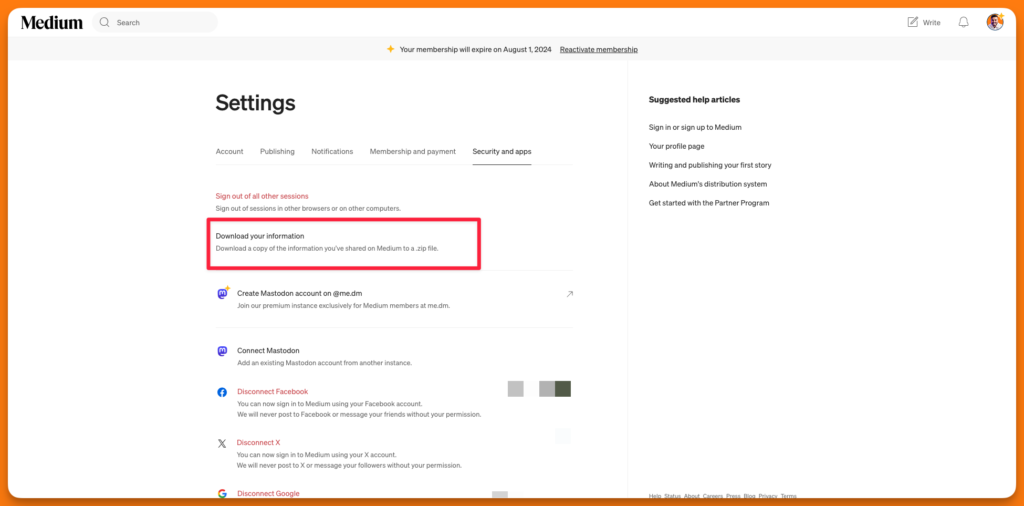
You will be prompted to confirm your download. Make sure your email address shown in the message, is accessible to you. That’s where you will get the download link.
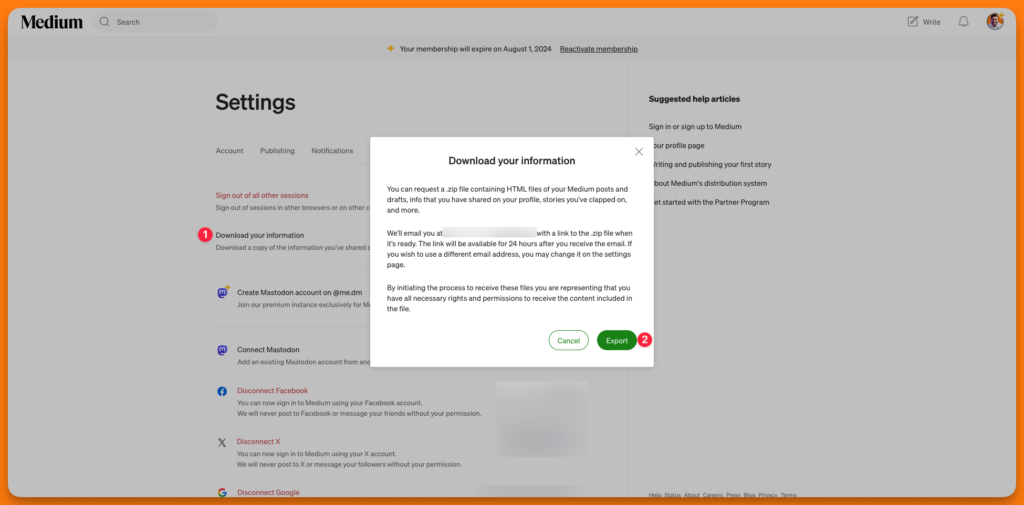
You should see a success message below.
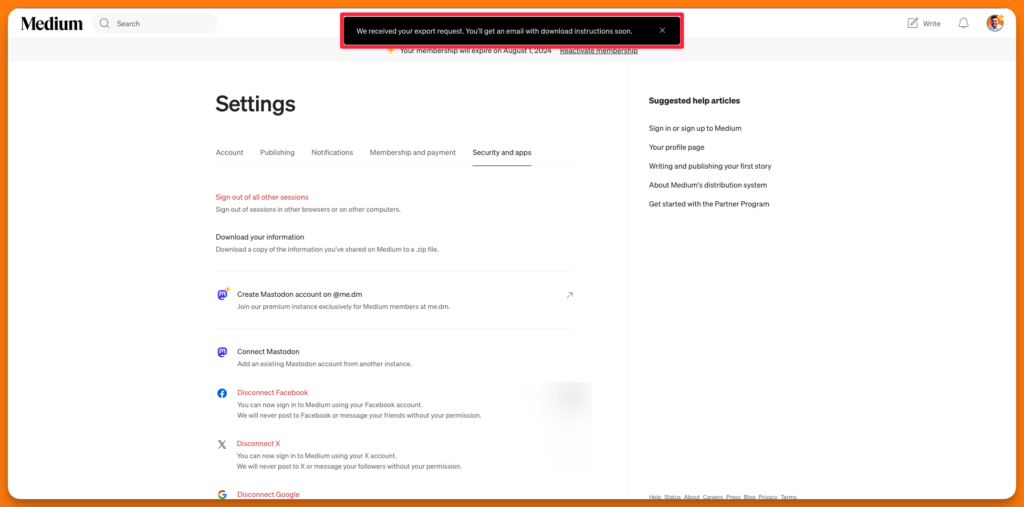
Once your download is ready, you will receive an email from Medium with a download link. Click to download the zip file.
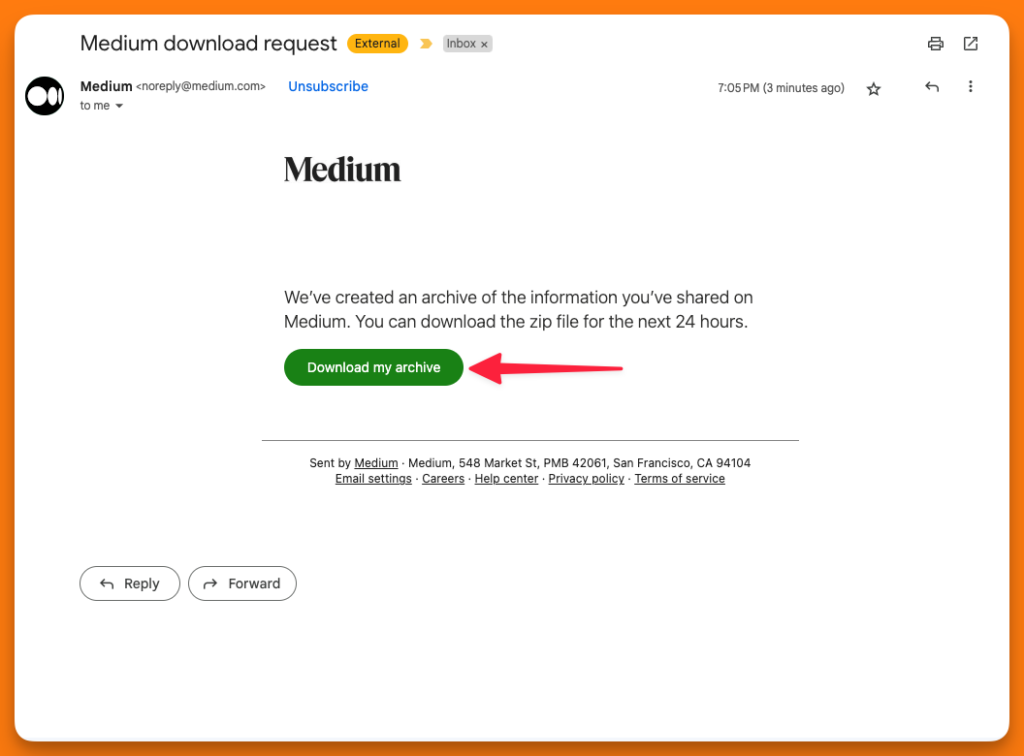
Your posts (published and drafts) from Medium are locally downloaded to your computer, and now you can import your content to WordPress.
Step 2: Convert the downloaded file
The problem with the downloaded file that Medium gives you is it contains everything related to your Medium account. Trying to import that into WordPress will show an error, as shown below.
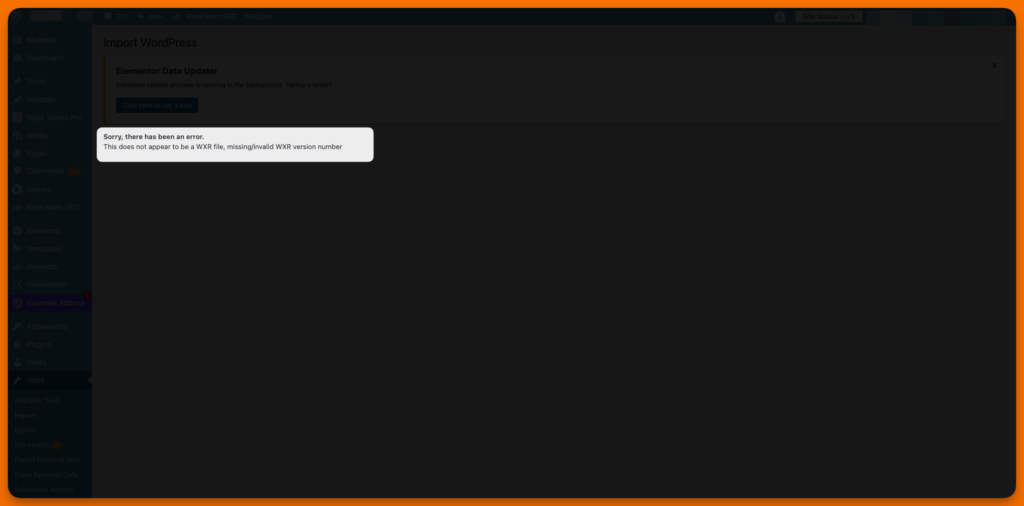
WordPress requires a WPX version of 1.1 to import correctly. However, the downloaded files from Medium might not have the WPX version WordPress requires.
Here’s the solution.
Navigate to this free tool and upload the downloaded file to import content from Medium to WordPress.
Enter the details in the respective fields, upload the Medium export file and then click on the “Export my Medium website” button.
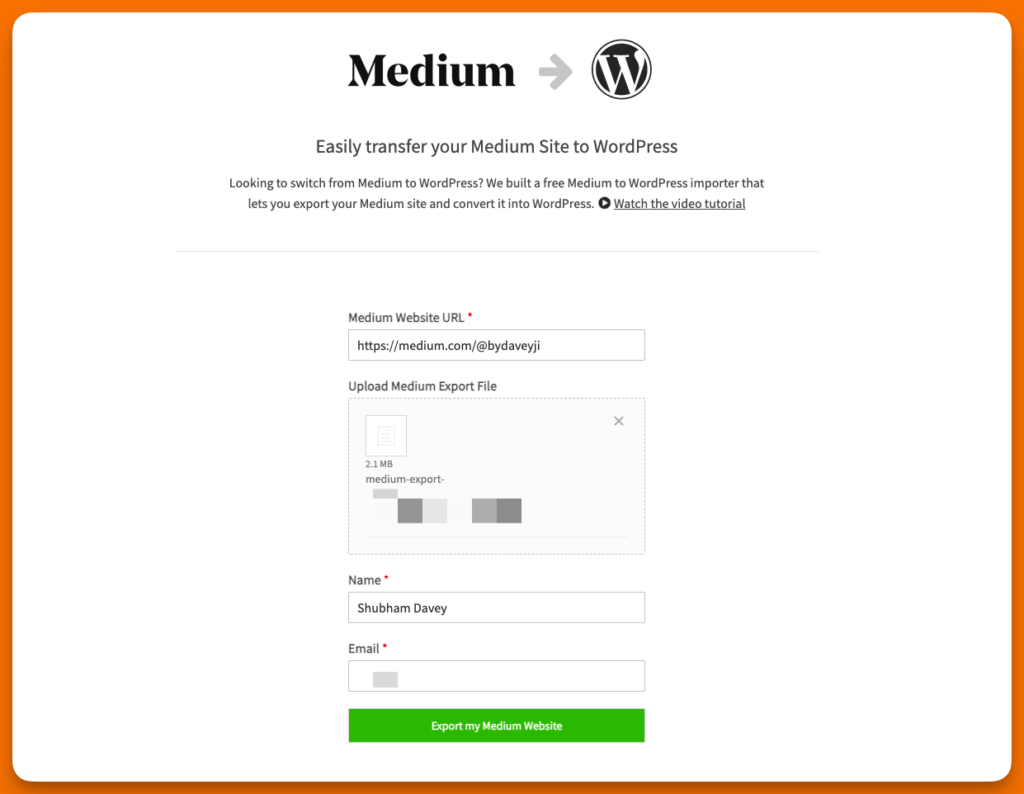
This will convert the Medium export file into a WordPress-compatible file. When you upload the converted file, you will be able to import your published posts into your WordPress.
If you have multiple authors on your WordPress site, you will be asked to choose the author to whom the posts should be assigned. If you choose to use WordPress.com, here’s how to migrate content from Medium to WordPress.
Step 3: Import data into WordPress
Note: I’m assuming that you already have a WordPress site, set up and ready to publish content. If you don’t, here’s a detailed guide on getting started with Blogging on WordPress.
With that said, here’s how to import Medium content into WordPress.
Login to your WordPress dashboard and then click on Tools » Import
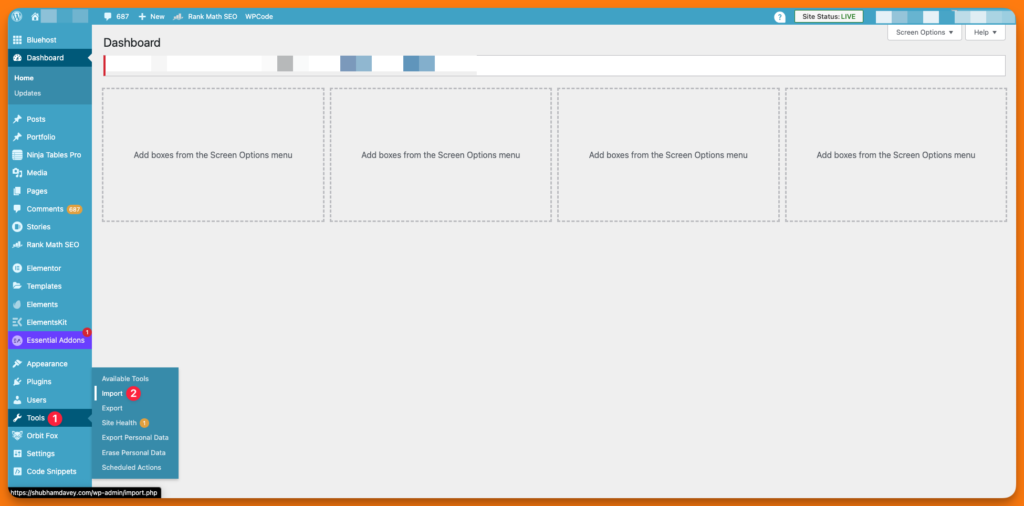
Click on Run Importer as shown below.
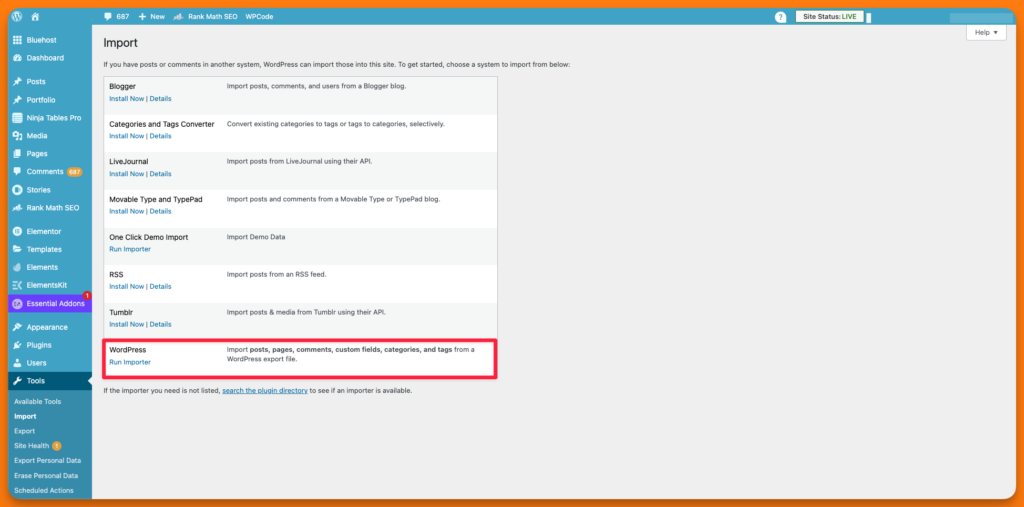
Then, choose the file that you saved in Step 1.
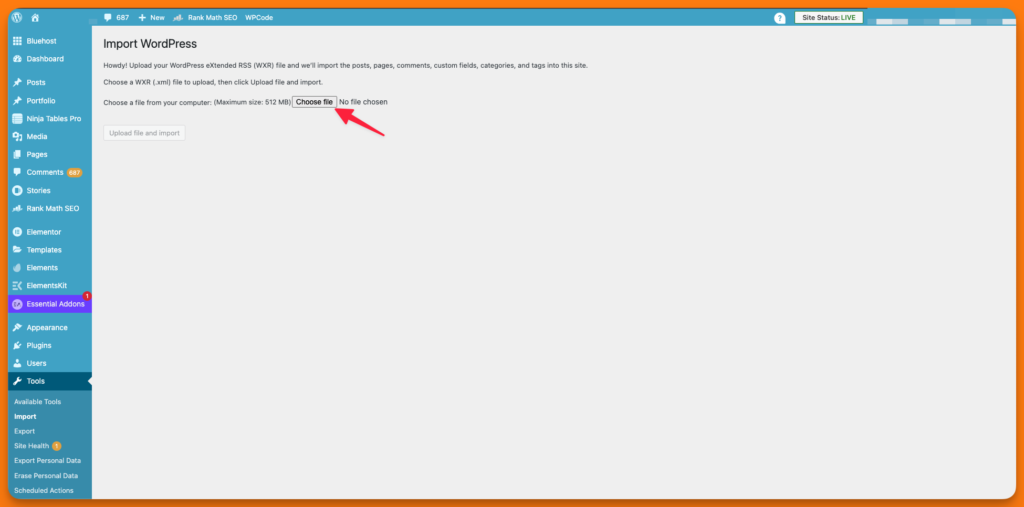
After you choose the converted file, you can upload and import the content from Medium to WordPress. Click on the Upload file and Import button to begin the importing process.
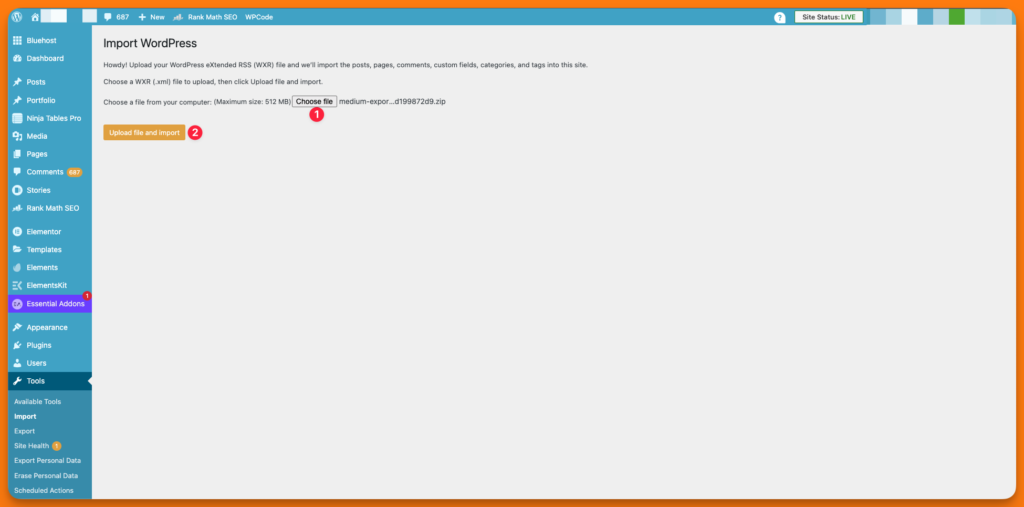
Step 4: Setting up redirects
This is required only if you have connected your custom domain to your Medium profile or publication. Remember, redirections will divert traffic coming to your Medium posts from external sources only, including posts shared on external sources in the past. You can set up redirections within the WordPress dashboard so that all your traffic to Medium is retained. Here’s a detailed guide to set up redirections.
Key Differences between Medium and WordPress
WordPress offers greater functionality, control, and customization but requires more technical know-how. Medium provides a simpler, more streamlined publishing experience but with less flexibility and control over your content and its presentation.
Here’s what differentiates the two platforms:
#1 Customization
- WordPress offers extensive customization options through themes and plugins. You can completely control the look and functionality of your site.
- Medium provides limited customization, focusing on a clean, standardized design across all publications.
#2 Content Control
- With WordPress, you have full ownership and control over your content. You host it on your own domain and can do whatever you want with it.
- On Medium, your content lives on their platform. They have the right to distribute and display it, and you’re subject to their terms of service.
#3 Monetization
- WordPress allows for diverse monetization options, including ads, sponsored content, and e-commerce integration.
- Medium has limited monetization features, primarily through its partner program where you can earn based on member engagement.
#4 Plugins and Functionality
- WordPress has a vast ecosystem of plugins (over 60,000) that can add various features and functionalities to your site.
- Medium doesn’t offer plugins or additional functionality beyond its core publishing features.
#5 SEO Control
- WordPress gives you full control over your SEO settings, with many plugins available to optimize your content for search engines.
- Medium provides basic SEO features but offers less control over advanced optimization.
#6 Analytics
- WordPress allows integration with comprehensive analytics tools like Google Analytics.
- Medium provides its own analytics, which are more limited in scope.
#7 Scalability
- WordPress can scale from a simple blog to a complex website with multiple functionalities.
- Medium is primarily designed for blogging and publishing, with limited scalability beyond that.
#8 Learning Curve
- WordPress has a steeper learning curve due to its extensive features and customization options.
- Medium is more user-friendly and makes it easier for beginners to start publishing quickly.
#9 Audience Reach
- Medium provides access to its built-in audience and distribution system.
- With WordPress, you’re responsible for building your own audience, but you have more control over how you do it.
Next steps after migration from Medium to WordPress
After you import content into WordPress there are a few things you should ensure. Here are the key steps to take after migrating content from Medium to WordPress:
- Double-check all content: Go through each post and page to make sure everything is transferred correctly. Look for any missing text, images, or formatting issues.
- Fix the formatting: Adjust headings, paragraphs, and other elements to look good on WordPress. Medium and WordPress handle formatting differently, so some tweaking is usually needed.
- Update metadata: Add or edit titles, descriptions, categories, and tags for each post. This helps with organization and SEO.
- Test functionality: Make sure things like comments, social sharing, and any embedded content are working properly on the new site.
- Optimize images: Compress and resize images as needed for faster loading. WordPress has different image handling than Medium.
- Check mobile responsiveness: Verify the site looks and functions well on phones and tablets. The WordPress theme may display differently than Medium.
- Update internal links: Find and update any links between posts that may have changed during migration.
- Set up analytics: Install and configure analytics tools like Google Analytics to track traffic on the new site.
- Inform readers: Let your audience know about the move to WordPress through a post, email, or social media update.
Frequently asked questions
#1 Will I lose my existing readers and followers when I switch to WordPress?
If you’ve had a custom domain connected to Medium, redirecting will redirect any traffic coming to articles published on Medium previously. However, the readers who found your content on Medium feed will no longer find your content.
#2 How can I make my WordPress blog look and feel similar to my Medium blog?
You can use free themes that match your requirements. If you like elegant yet minimalistic themes, consider using Generate Press. It’s lightning fast and you can get several templates to fully customize the look and feel of your site.
#3 What happens to my Medium stats and earnings after I move to WordPress?
It’s evident that the Medium stats & earnings would crash down to zero. The stats will be reflected in Google Analytics or any search traffic tracking tool. But if you used the Medium Partner Program as the main source of revenue, that will vanish.
#4 Which platform is better for SEO, Medium or WordPress?
If you’re a control freak and have a decent knowledge of DIY SEO, there’s nothing better than WordPress. However, if you want less hassle of managing a website and solely focus on content writing Medium is the best and most affordable option. You can enhance the ROI further by connecting a custom domain to your Medium profile or publication.
#5 How does the user experience differ between Medium and WordPress?
From a content creation standpoint, Medium is more straightforward and easy to manage, and from a reader’s standpoint, Medium page is minimalistic and distraction-free. WordPress is much better in terms of content creation, as it gives endless control and customization. You can always make your WordPress blog minimalistic, like Medium, using Generate Press theme templates.
#6 Can I monetize my content more effectively on WordPress than on Medium?
WordPress offers a plethora of options to monetize your content. You can add Adsense code or any ad network’s code. You have sidebars on Medium, which you can use to promote affiliate products using custom-made images or images provided by the affiliate partner. Medium is very simple when it comes to monetization. You can sign up for the Medium Partner Program and/or insert affiliate links (which some publications won’t allow) or promote your own products/services in your posts.
#7 What are the limitations of customization on Medium compared to WordPress?
You can customize the look and feel of your Medium profile and publication. However, with WordPress, you can customize almost every single aspect of your blog.
#8 How does the audience engagement differ between Medium and WordPress
Medium has an algorithm to distribute content on their platform based on their interests. However, Medium posts are optimized to rank on search engines. You can promote/repurpose your Medium posts on other social media platforms to increase traffic to your posts. On WordPress, it’s pretty much the same. There are SEO plugins that help you optimize your posts for search engines, but how soon it rank is beyond your control. Medium’s distribution on its own platform is a plus point that WordPress doesn’t have.


